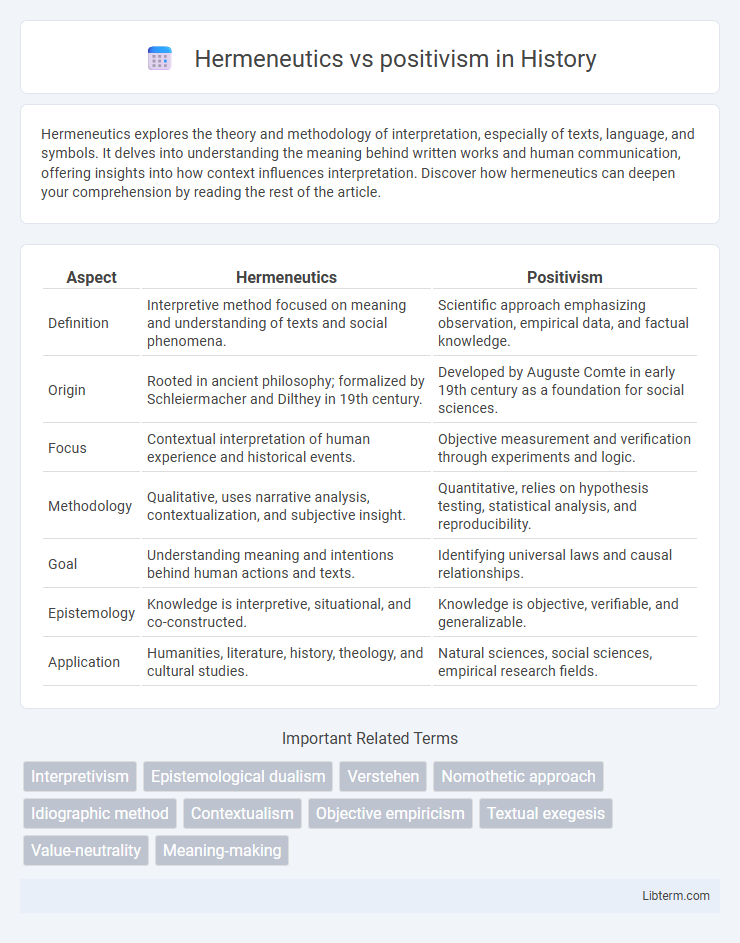Hermeneutics explores the theory and methodology of interpretation, especially of texts, language, and symbols. It delves into understanding the meaning behind written works and human communication, offering insights into how context influences interpretation. Discover how hermeneutics can deepen your comprehension by reading the rest of the article.
Table of Comparison
| Aspect | Hermeneutics | Positivism |
|---|---|---|
| Definition | Interpretive method focused on meaning and understanding of texts and social phenomena. | Scientific approach emphasizing observation, empirical data, and factual knowledge. |
| Origin | Rooted in ancient philosophy; formalized by Schleiermacher and Dilthey in 19th century. | Developed by Auguste Comte in early 19th century as a foundation for social sciences. |
| Focus | Contextual interpretation of human experience and historical events. | Objective measurement and verification through experiments and logic. |
| Methodology | Qualitative, uses narrative analysis, contextualization, and subjective insight. | Quantitative, relies on hypothesis testing, statistical analysis, and reproducibility. |
| Goal | Understanding meaning and intentions behind human actions and texts. | Identifying universal laws and causal relationships. |
| Epistemology | Knowledge is interpretive, situational, and co-constructed. | Knowledge is objective, verifiable, and generalizable. |
| Application | Humanities, literature, history, theology, and cultural studies. | Natural sciences, social sciences, empirical research fields. |
Introduction to Hermeneutics and Positivism
Hermeneutics centers on interpreting meaning within texts, emphasizing context, subjective experience, and the role of the interpreter, contrasting sharply with positivism's focus on observable, empirical data and scientific methodology. While positivism seeks objective truths through quantifiable evidence, hermeneutics prioritizes understanding through dialogue and the exploration of underlying intentions and cultural contexts. This fundamental difference shapes research approaches in humanities versus natural sciences, highlighting hermeneutics' qualitative depth against positivism's quantitative rigor.
Historical Origins and Development
Hermeneutics originated in ancient philosophy with figures such as Aristotle and Schleiermacher, emphasizing interpretation and understanding of texts and human experiences. Positivism began in the 19th century with Auguste Comte, advocating for empirical observation, scientific methods, and measurable data as the basis for knowledge. While hermeneutics focuses on subjective meaning and context, positivism prioritizes objective facts and generalizable laws in the development of knowledge systems.
Core Philosophical Assumptions
Hermeneutics centers on understanding the meanings and subjective experiences behind human behavior, emphasizing context, interpretation, and the intentionality of social actors. Positivism relies on empirical observation, scientific methods, and quantifiable data to uncover universal laws governing phenomena, prioritizing objectivity and measurement. These core philosophical assumptions highlight hermeneutics' focus on qualitative insight and interpretive frameworks, contrasting with positivism's commitment to empirical verification and generalization.
Methodological Differences
Hermeneutics emphasizes the interpretation of meaning within texts and social contexts, relying on qualitative methods such as thematic analysis and narrative inquiry to uncover subjective understanding. Positivism prioritizes empirical observation and measurement, utilizing quantitative methods like experiments and surveys to establish objective, generalizable laws. The methodological difference lies in hermeneutics seeking depth of meaning through context-sensitive analysis, while positivism demands replicable data and hypothesis testing.
Role of Objectivity and Subjectivity
Hermeneutics emphasizes subjectivity as it seeks to understand meanings through interpretation of texts and human experiences, acknowledging the influence of cultural and historical contexts on understanding. Positivism prioritizes objectivity by relying on observable, measurable facts and empirical evidence to produce unbiased knowledge through scientific methods. The contrast highlights hermeneutics valuing subjective insights for deeper comprehension, while positivism advocates for detached, objective verification to establish universal truths.
Interpretive vs. Empirical Approaches
Hermeneutics centers on interpretive approaches, emphasizing understanding the meaning and context of human experiences through qualitative analysis. Positivism relies on empirical methods, prioritizing observable, measurable data and scientific experimentation to generate knowledge. While hermeneutics seeks deep insight into subjective realities, positivism aims for objective, generalizable facts through structured inquiry.
Application in Social Sciences
Hermeneutics in social sciences emphasizes interpreting human behavior, culture, and social phenomena through understanding context, meaning, and subjective experiences, making it ideal for qualitative research and ethnography. Positivism applies scientific methods and empirical observation to study social facts, prioritizing quantifiable data and hypothesis testing, thus favoring statistical analysis and generalizable findings. While hermeneutics seeks deep insight into social realities through interpretation, positivism strives for objectivity and prediction via measurable evidence.
Strengths and Limitations of Hermeneutics
Hermeneutics excels in interpreting complex human experiences and texts, emphasizing context, meaning, and subjective understanding, which allows for deeper insights in social sciences and humanities. However, its reliance on interpretation can lead to subjective biases and challenges in replicability, limiting its applicability in empirical validation compared to positivism. Hermeneutics struggles with establishing universal truths, focusing instead on nuanced, pluralistic perspectives that can hinder generalization across diverse contexts.
Strengths and Limitations of Positivism
Positivism excels in providing clear, measurable, and empirical data through systematic observation, fostering scientific rigor and replicability in research. Its limitation lies in disregarding subjective experiences and the deeper meanings behind human behavior, often neglecting context and interpretive nuances. This results in a constrained understanding of social phenomena, where qualitative insights from hermeneutics offer complementary perspectives.
Contemporary Relevance and Debates
Hermeneutics emphasizes interpretive understanding of meaning within social contexts, contrasting with positivism's reliance on empirical data and scientific methods for knowledge validation. Contemporary debates focus on the integration of qualitative insights from hermeneutics to address complex social phenomena inadequately explained by positivist approaches. This dynamic interplay shapes interdisciplinary research methodologies, influencing fields like sociology, anthropology, and education in addressing modern epistemological challenges.
Hermeneutics Infographic

 libterm.com
libterm.com